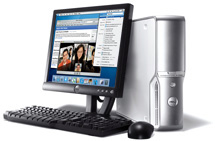
In its 30-year history, Apple Computer, Inc. has always maintained a significant mind-share in the technology sector and will likely continue to do so for the next 30 year. Lately, however, Apple seems to be attracting even more than its normal share of attention on most industry news sites and blogs. As Apple nears the near-flawless completion of its historic move to Intel processor technology, newssphere and blogsphere are filled with rumors and speculation about Apple's next bold move.
Will the next iPod be a tablet Mac? Is the iPhone on the way? Who is Apple looking to purchase? When will they once again license OS X to PC makers? These are just a small sample of the questions and speculation that have Mac-fans, and Mac-haters filling the Ether with opinions both pro and con towards Apple.
Speculation that Apple may purchase Adobe has been thrown into full fury thanks to an article by Robert X. Cringely on PBS.org has garnered a lot of reaction on Slashdot current, with techies weighing in on both sides of the issue. Adobe is a significant player in the software industry with key products such as Acrobat and Dreamweaver. Their latest release of Photoshop is beating Aperture in the market. While this seems like a tempting idea, it is a business Apple wants to be in? In reality a large acquisition like this would likely eat up too much of Apple's attention and resources and would negatively impact their current momentum.
Another article by Cringley, suggesting that Apple is about to release a version of Boot Camp that will allow any PC to run OS X has created a similar slugfest on Slashdot. It could be argued, however, that this move would be contrary to Apple's proven track record to "Think Different".
A much more likely scenario would be for Apple to selectively pick two or three PC maker-partners to license the OS X security chip technology to. The caveat would be that these partners, Dell and Sony are the most likely, would handle the development of their own drivers, under very tight requirements by Apple.
Licensing all PC Makers to run OS X would create a mess for Apple similar to what Microsoft must deal with for every release of Windows -- that of having to develop and test all of the drivers for all of the hardware. That is one if the key reasons why the OS X experience today is so good. Apple tightly controls the drivers, which in comparison are relatively few. Why risk breaking one of the hallmarks of your product?
Licensing to two or three big vendors gets for Apple what it really wants, without substantially creating too much risk. It gives Apple three key things - 1) important new distribution channels (can you say "Market Share?), 2) a break from the "single vendor" label that enterprise worries about, and 3) important validation and increased credibility as THE major leader in IT and PC technology.
Normally a hardware vendor would balk at that, but right now Apple may have just enough traction to make it attractive to some PC makers. After all, Macs are currently own all top 5 spots on Amazon.com for most popular computers and 7 of the top 10 spots. Dell has already expressed interest in selling OS X on Dell hardware. Apple and Sony have a strong and recently renewed relationship.
A "Dell-flavored" or "Sony-flavored" OS X would not be movable to another system from another hardware maker, but that's good for the PC partner because it means that people buy complete systems and peripherals from the partner.
Apple obviously wants more market share -- enough to solidify relevance, but contrary to what some may think, Apple doesn't want to control the world. Apple really only wants about 10 or 15 percent market share. After all, why would they want to become the new big target? (Forester projects they will double in market share over the next year or two.) Apple wants to continue to lead innovation, be profitable, and grab a comfortable piece of the Enterprise business to cement their long-term existence. But profit is more important to Apple than market share because profit drives R&D which drives innovation.


